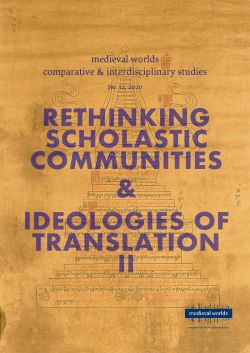Lidia Negoi
S. 210 - 233
doi:
10.1553/medievalworlds_no12_2020s210
Verlag der Österreichischen Akademie der Wissenschaften
doi:
10.1553/medievalworlds_no12_2020s210
Abstract:
This article discusses the phenomenon of bilingualism in medieval sermons by focusing on one of the most understudied areas of sermon studies – fourteenth-century Catalonia and Aragon. Specifically, I concentrate on Latin sermons, which remain largely underexplored, partly due to a certain historiographical bias that favours »national« languages over Latin. The main focus is on Dominican sermons from the Aragonia Province (which included Catalonia and Aragon). The main argument is that bilingualism in sermons was an editorial communicative strategy acquired and developed in an educational context, i.e. in how language was approached and learnt by bilingual users. To make my case, I first discuss the language training of the Dominicans from Aragon and briefly review some bilingual grammatical works in order to place the bilingualism of the sermons within a wider context of written (and spoken) multilingualism. Second, I address bilingualism and code-switching in sermons by analysing texts in which Latin is the matrix language, the most common type of sermon evidence preserved from this area. As in better studied areas, such as France, England, or Italy, the linguistic intermingling in fourteenth-century sermons from Catalonia covers all types of »macaronicity«, as categorised by Siegfried Wenzel. Thus, the paper will add to current debates that seek to understand medieval bilingualism (written and spoken) as a late medieval Europe-wide phenomenon by discussing hitherto unstudied and underexplored evidence in manuscripts that remains largely unknown to scholarship.
bilingualism; code switching; macaronic sermons; Catalonia; Dominican Order; Nicholas Eymerich; Guillelmus Simonis
Published Online:
2020/11/30 15:16:31
Object Identifier:
0xc1aa5576 0x003c0977
Rights:All rights reserved.For questions regarding copyright and copies please contact us by email.
medieval worlds provides a forum for comparative, interdisciplinary and transcultural studies of the Middle Ages. Its aim is to overcome disciplinary boundaries, regional limits and national research traditions in Medieval Studies, to open up new spaces for discussion, and to help developing global perspectives. We focus on the period from c. 400 to 1500 CE but do not stick to rigid periodization.
medieval worlds is open to submissions of broadly comparative studies and matters of global interest, whether in single articles, companion papers, smaller clusters, or special issues on a subject of global/comparative history. We particularly invite studies of wide-ranging connectivity or comparison between different world regions.
Apart from research articles, medieval worlds publishes ongoing debates and project and conference reports on comparative medieval research.
Rethinking Scholastic Communities in Medieval Eurasia
Guest Editors: Pascale Hugon and Birgit Kellner
Rethinking Scholastic Communities in Medieval Eurasia: Introduction
Pascale Hugon and Birgit Kellner
Rethinking Scholastic Communities in Latin Europe:
Competition and Theological Method in the Twelfth Century
Constant J. Mews
Rethinking Buddhist Scholastic Communities Through a Socio-Historical Lens
José Ignacio Cabezón
Myang ral Nyi ma ’od zer (1124-1192):
Authority and Authorship in the Coalescing of the rNying ma Tantric Tradition
Cathy Cantwell
Between disputatio and Polemics: Dialectics as Production of Knowledge in the Middle Ages
Bénédicte Sère
The Tibetan Institutionalisation of Disputation: Understanding a Medieval Monastic Practice
Jonathan Samuels
Ideologies of Translation, II
Hostili praedo ditetur lingua latina: Conceptual Narratives of Translation in the Latin Middle Ages
Réka Forrai
Multilingual Sermons
Guest Editor: Jan Odstrčilík
Multilingual Medieval Sermons: Sources, Theories and Methods
Jan Odstrčilík
Multilingual Texts as a Reflection of Code-Switching in Medieval England: Sermons and Beyond
Herbert Schendl
Orality in its Written Traces: Bilingual reportationes of Sermons in France (Thirteenth Century)
Nicole Bériou
Bilingualism in Medieval Italian Preaching: The Case of Angelo da Porta Sole (d. 1334)
Carlo Delcorno
Bilingual Strategies in Fourteenth-Century Latin Sermons from Catalonia
Lidia Negoi
Typology and Spectrum of Latin-Irish and Latin-English Codeswitches
in Medieval Sermon Literature
Tom ter Horst
Review Article
Review Article: How Far is Global?
Roy Flechner




 Home
Home Print
Print
 References
References
 Share
Share
